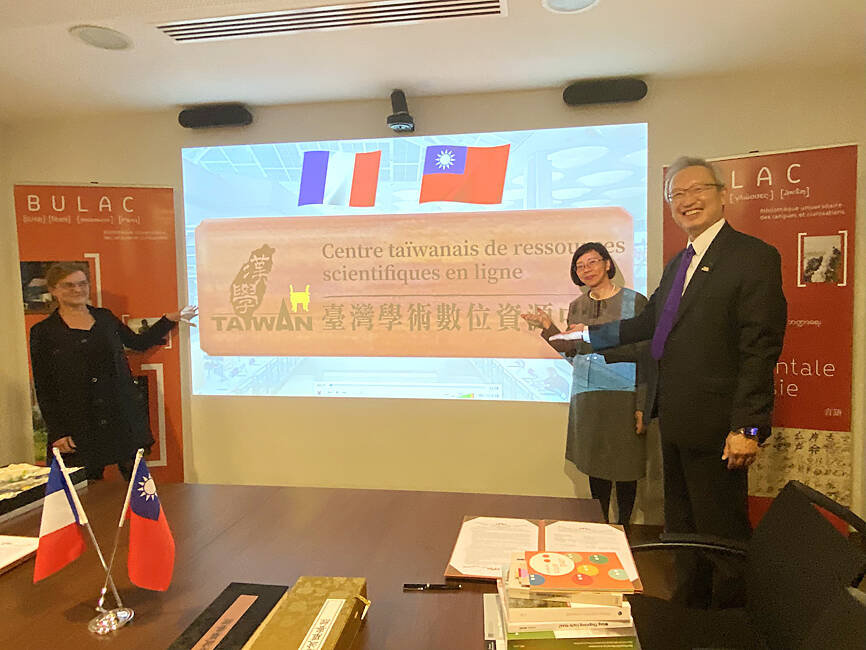The National Central Library on Monday launched its first Taiwan Academic Digital Resource Center in Paris to help improve the accessibility of Taiwanese research documents to academics in France.
The center was established in collaboration with the Paris-based University Library of Languages and Civilizations (BULAC) and inaugurated at an event attended by National Central Library Director-General Tseng Shu-hsien (曾淑賢) and BULAC director Marie-Lise Tsagouria.
The new center is an online service that provides digital resources for research, including electronic books, compiled by the National Central Library and other Taiwanese institutions or businesses, Tseng said.

Photo: CNA
Digitization can help solve storage issues and distance constraints, while saving time for researchers, she said.
“Through digital transformation, the National Central Library has established the first-ever Taiwan Academic Digital Resource Center to help Taiwan research be accessible to French academics,” she said.
The National Central Library seeks to deepen its cooperation with BULAC, including by organizing workshops and online lectures, she said.
The center is the first platform of its kind launched in collaboration with a foreign partner, Tsagouria said, adding that it is a model for other institutions.
BULAC anticipates more cooperation with the National Central Library, whether it be in Chinese-language studies or library training, she said.
Monday’s ceremony also included the signing of an agreement between the two institutions to collaborate on a catalog of ancient Chinese books.
The National Central Library since 2005 has been involved in digitization cooperation projects in numerous countries with university and national libraries that have important ancient Chinese books.
It has Taiwan Resource Center for Chinese Studies in 40 countries, which provide institutions with physical copies of Taiwanese research materials.

‘DENIAL DEFENSE’: The US would increase its military presence with uncrewed ships, and submarines, while boosting defense in the Indo-Pacific, a Pete Hegseth memo said The US is reorienting its military strategy to focus primarily on deterring a potential Chinese invasion of Taiwan, a memo signed by US Secretary of Defense Pete Hegseth showed. The memo also called on Taiwan to increase its defense spending. The document, known as the “Interim National Defense Strategic Guidance,” was distributed this month and detailed the national defense plans of US President Donald Trump’s administration, an article in the Washington Post said on Saturday. It outlines how the US can prepare for a potential war with China and defend itself from threats in the “near abroad,” including Greenland and the Panama

A wild live dugong was found in Taiwan for the first time in 88 years, after it was accidentally caught by a fisher’s net on Tuesday in Yilan County’s Fenniaolin (粉鳥林). This is the first sighting of the species in Taiwan since 1937, having already been considered “extinct” in the country and considered as “vulnerable” by the International Union for Conservation of Nature. A fisher surnamed Chen (陳) went to Fenniaolin to collect the fish in his netting, but instead caught a 3m long, 500kg dugong. The fisher released the animal back into the wild, not realizing it was an endangered species at

The High Prosecutors’ Office yesterday withdrew an appeal against the acquittal of a former bank manager 22 years after his death, marking Taiwan’s first instance of prosecutors rendering posthumous justice to a wrongfully convicted defendant. Chu Ching-en (諸慶恩) — formerly a manager at the Taipei branch of BNP Paribas — was in 1999 accused by Weng Mao-chung (翁茂鍾), then-president of Chia Her Industrial Co, of forging a request for a fixed deposit of US$10 million by I-Hwa Industrial Co, a subsidiary of Chia Her, which was used as collateral. Chu was ruled not guilty in the first trial, but was found guilty

DEADLOCK: As the commission is unable to forum a quorum to review license renewal applications, the channel operators are not at fault and can air past their license date The National Communications Commission (NCC) yesterday said that the Public Television Service (PTS) and 36 other television and radio broadcasters could continue airing, despite the commission’s inability to meet a quorum to review their license renewal applications. The licenses of PTS and the other channels are set to expire between this month and June. The National Communications Commission Organization Act (國家通訊傳播委員會組織法) stipulates that the commission must meet the mandated quorum of four to hold a valid meeting. The seven-member commission currently has only three commissioners. “We have informed the channel operators of the progress we have made in reviewing their license renewal applications, and